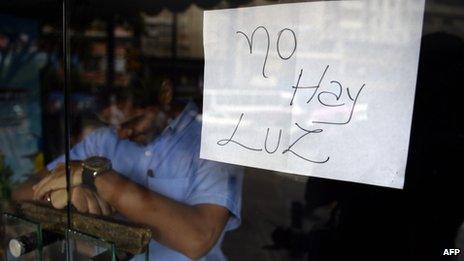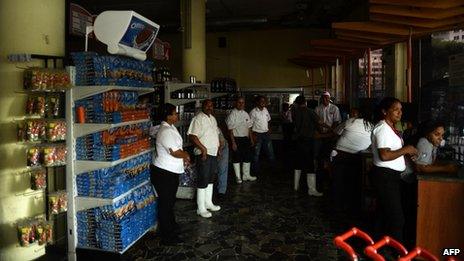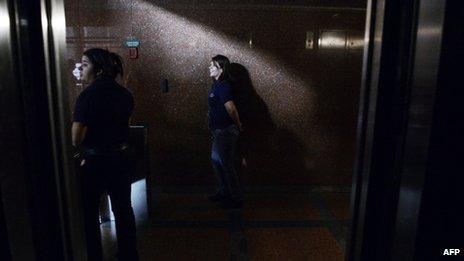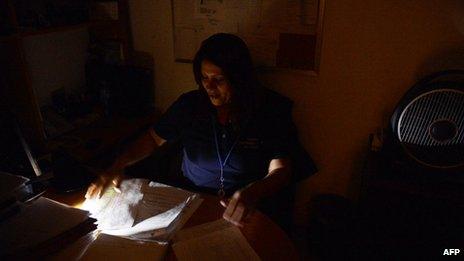Power cut leaves most of Venezuela without electricity
- Published
Traffic lights, coffee vendors and cash machines were all hit by the blackout, as Ian Booth reports
A power cut has left 70% of Venezuela without electricity, including parts of the capital Caracas.
The blackout disabled traffic lights in the city, causing traffic chaos. It also partially disrupted the underground transport system.
Thousands of workers were sent home. Power was slowly being restored in different areas after the cuts.
Venezuelan President Nicolas Maduro blamed the opposition for "sabotage" to power transmission lines.

'There's no electricity', a sign on the door of a shop in Caracas declares

Supermarket workers wait for power to come back on so the shop can reopen

In this building corridor the lift service has been paralysed

Workers had to continue their day making use of whatever light available
"Everything seems to indicate that the extreme right has resumed its plan for an electrical strike against the country," he said in a tweet.
In a live address on state television, the president also said the cuts were "part of a low-level war" against the country, a "folly by twisted and desperate minds".
'Poor upkeep'
President Maduro did not give any evidence of the "sabotage" but said he had instructed the military "to protect the entire country".
Opposition leader Henrique Capriles said the government was trying to divert public attention from the country's problems by concocting the conspiracy theory.
Deputy Electrical Energy Minister Franco Silva said a fault had occurred in one of the national grid's main transmission lines at 12:30 local time (17:00GMT).
The cut affected large parts of the country for about three hours, after which time power was gradually restored.
The oil industry was not affected as Venezuela's oil refineries are powered by separate generator plants.
Government officials have in the past said that high energy consumption at peak times and poor maintenance of transmission lines have led to a high incidence of cuts.
In 2010 the late President Hugo Chavez signed a decree declaring an "electricity emergency" to help his government tackle power shortages.
The opposition says the government of Mr Chavez and his successor, Nicolas Maduro, may have spent billions of dollars on programmes to garner votes from the poor but has failed to invest in the upkeep and expansion of the electrical grid to meet growing demand.
Although Venezuela has big oil reserves, it is dependent on hydro-electricity for some 70% of its power.
Power cuts are common in Venezuela, especially in the country's interior states, but rarely affect the capital, Caracas.
- Published4 September 2013
- Published28 May 2013